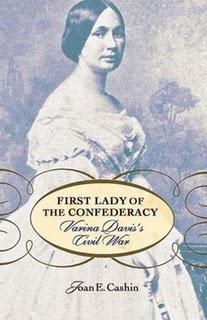First Lady of the Confederacy: Varina Davis's Civil War

Before reading First Lady of the Confederacy: Varina Davis's Civil War, I didn’t even know to whom Jefferson Davis, the president of the Confederate States of America from 1861-1865, was married. The book is certainly educational, and was interesting to read about the war from a Southern perspective rather than the Union point of view I received in my U.S. history courses.
Most readers of this lengthy biography on Varina Howell Davis will come away with the impression that her husband was a jerk, although she seems to have loved him nonetheless. He was quick-tempered and held too many grudges, and sadly these same faults were apparent in his second marriage. His first wife, Sarah Knox Taylor, the daughter of President Zachary Taylor, died from malaria shortly after marrying Jefferson. He and Varina wed ten years later, in 1845. In some ways Varina Davis was ahead of her time: she was better-educated and better-read than most women in the American South. Combined with her lukewarm support of secession from the United States and of the Confederacy as a nation, her educated demeanor did not endear her to many Southerners. Although Davis was against the war, she supported the institution of slavery. Cashin substantiates this claim with extensive documentation from Davis' private letters, which she compares Davis’ somewhat more confident public statements in support of the 'new nation'.
Cashin does an excellent job of showing Davis had considerable ties to the Northern states. She had many relatives and friends there that she made during her time at a finishing school in Philadelphia and when her husband served in the U.S. Senate and they lived in Washington, DC. Whatever her reasons, she never fully supported the Confederate cause, and continued correspondence with friends in the Union states during the war, which was illegal under Confederate law.
The most interesting aspect of the book is its description of Varina’s life after her husband’s death in 1889. Finally free to do as she pleased, she moved to New York City, where she remained for the rest of her life (she died in 1906), despite the protestations of groups, such as the Daughters of the Confederacy, and Southerners in general. She supported herself through occasional columns for newspapers and formed an unexpected friendship with Julia Grant, the widow of Ulysses S. Grant, who headed the Union army to which the Confederate army surrendered at the war’s end.
The book’s main drawback is its dry, academic tone and repetition of key facts, particularly Davis’s wavering support of the Confederacy and the fact that Jefferson’s professed love for her became more word than deed during the post-war years of their relationship. The book weighs in at 416 pages, with over 311 pages of biography and 105 of meticulous notes. Recommend primarily to hard-core Civil War junkies, the book demonstrates that Varina Howell Davis’ life was constricted not only by her spouse’s politics, but also by the mores of the time.